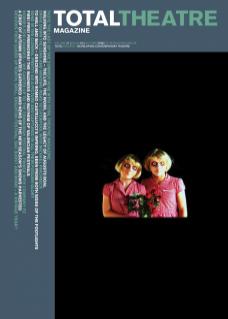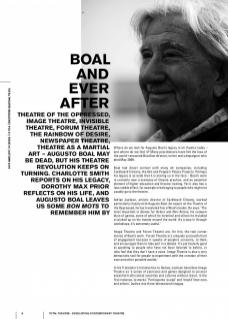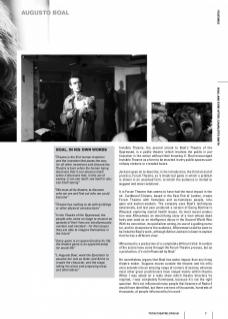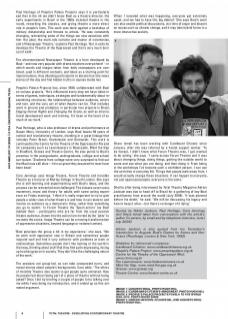Where do we look for Augusto Boal’s legacy in UK theatre today – and where do we find it? Many practitioners have felt the loss of the world-renowned Brazilian director, writer and campaigner who died May 2009.
Boal had direct contact with many UK companies, including Cardboard Citizens, the RSC and People’s Palace Projects. Perhaps his legacy is so wide that it is staring us in the face – Boal’s work is certainly now a mainstay of theatre practice, and an essential element of higher education and theatre training. Yet it also has a less visible effect, for example in belonging to people who might not usually go to the theatre.
Adrian Jackson, artistic director of Cardboard Citizens, worked particularly closely with Augusto Boal. An expert on the Theatre of the Oppressed, he has translated five of Boal’s books. He says: ‘The most important is Games for Actors and Non-Actors, his compendium of games, some of which he invented and others he included or picked up on his travels around the world. As a way in through workshops, it’s extremely useful.’
Image Theatre and Forum Theatre are, for him, the two cornerstones of Boal’s work. ‘Forum Theatre is a uniquely successful tool of engagement because it speaks of people’s concerns, to them, and encourages them to take part in a debate. It’s particularly good at speaking to people who have not been listened to before, or who feel that they don’t have a voice. Image Theatre is also a very democratic tool for people to experiment with the creation of their own and other possible worlds.’
In his Translator’s Introduction to Games, Jackson describes Image Theatre as ‘a series of exercises and games designed to uncover essential truths about societies and cultures without resort, in the first instance, to words.’ Participants ‘sculpt’ and ‘mould’ their own, and others’, bodies into three-dimensional images.
Invisible Theatre, the second strand to Boal’s Theatre of the Oppressed, is a public theatre ‘which involves the public in participation in the action without their knowing it’. Boal encouraged Invisible Theatre as a form to be enacted in very public spaces such railway stations or crowded buses.
Jackson goes on to describe, in his introduction, the third strand of practice, Forum Theatre, as ‘a theatrical game in which a problem is shown in an unsolved form, to which the audience is invited to suggest and enact solutions’.
It is Forum Theatre that seems to have had the most impact in the UK. Cardboard Citizens, based in the East End of London, create Forum Theatre with homeless and ex-homeless people, refugees and asylum-seekers. The company uses Boal’s techniques extensively, and last year produced a version of Georg Büchner’s Woyzeck, exploring mental health issues. Its most recent production was Mincemeat, an electrifying story of a man whose dead body was used as an intelligence decoy in the Second World War. With its conviction, its quicksilver acting, its use of a guiding narrator, and its closeness to the audience, Mincemeat could be seen to be linked to Boal’s work, although Adrian Jackson is keen to explain that he has a different view:
‘Mincemeat is a production of a completely different kind. A number of the actors have come through the Forum Theatre process, but as a production, it’s not influenced by Boal.’
He nonetheless argues that Boal has wider impact than any living theatre maker. ‘Augusto moves outside the theatre and his influence extends into an amazing range of corners of society, whereas most other great practitioners have stayed mainly within theatre. When I was asked on a radio show which theatre directors he inspired, I was completely flummoxed, because it’s not the right question. He’s not influenced many people that listeners of Radio 4 would have identified, but there are tens of thousands, hundreds of thousands, of people influenced by his work.’
Paul Heritage of People’s Palace Projects says it is particularly sad that in the UK we didn’t know Boal as a theatre director. His early experiments in Brazil in the 1960s included theatre in the round, reworking the classics, and giving theatre a more direct role in people’s lives. This work was done against a backdrop of military dictatorship and threats to artists. ‘He was constantly changing, reinventing some of the things we now associate with him: the joker, the multi-role narrator and master of ceremonies, and of Newspaper Theatre,’ explains Paul Heritage. ‘But in exile he develops the Theatre of the Oppressed and that’s very much born out of exile’.
The aforementioned Newspaper Theatre is a form developed by Boal – and now very popular with drama teachers everywhere! – in which words and images taken from daily newspapers are combined, used in different contexts, and taken as a starting point for improvisations, thus allowing participants to deconstruct the news stories of the day and find hidden truths or expose media lies.
People’s Palace Projects has, since 1989, collaborated with Boal on various projects. ‘He’s influenced every step we have taken in terms of games, techniques, strategies and fundamentally about reexamining structures, the relationships between audience, actors and text, and the very act of what theatre can be. That includes work in prisons and probation, in particular two projects in Brazil, Staging Human Rights and Changing the Scene, as well as international development work and training. It’s been at the heart of so much of our work.’
Paul Heritage, who is also professor of drama and performance at Queen Mary, University of London, says Boal leaves 50 years of radical and revolutionary theatre, standing in a great lineage that includes Peter Brook, Stanislavski and Grotowski. This work is continued by the Centre for the Theatre of the Oppressed in Rio and UK companies such as Lawnmowers in Newcastle, Mind the Gap in Bradford, Graeae and Theatre Centre. He also points to Boal’s presence in the postgraduate, undergraduate, college and school curriculum. ‘Students from college were very surprised to find out that Boal was still alive—he’s so great they assumed he must have been dead.’
Cara Jennings uses Image Theatre, Forum Theatre and Invisible Theatre as a lecturer at Morley College in South London. She says she is still learning and experimenting with Boal’s ideas, and the process can be reinvented and challenged. The classes cover voice, movement, impro and theory for adults with some acting experience on Friday evenings. ‘I think it’s really important to try to give people a wider view of what theatre is and how it can relate to and involve an audience as a democratic thing, rather than something you go to watch.’ In Forum Theatre the ‘Spect-actors’ (as Boal dubbed them – participants who are far from the usual passive theatre audience, drawn into the action) are invited by the ‘joker’ to recreate the scene. Image Theatre can be a moving transformation of oppressive situations, beyond language or national context.
‘Boal polarises the group a bit in my experience,’ she says. ‘We do work with oppression now in Britain and sometimes people respond well and find it very cathartic with problems at work or relationships. Sometimes people don’t like looking at the world in that way, thinking about stuff that they find quite depressing, facing up to what goes on in society. They don’t like the challenging nature of the work.’
The sessions are group-led, so can take unexpected turns, and reveal stories about people’s backgrounds. Cara adds: ‘The ethics of Invisible Theatre also seems to get people quite animated. How do people feel about being part of a piece of theatre without being asked? Once I did try briefing a couple of people to be talking over me while I was doing my introduction, and it ended up as this animated argument.
Shara Ismail has been working with Cardboard Citizens since January, after she was referred by a hostel support worker. ‘To be honest, I didn’t know what Forum Theatre was, I just wanted to do acting,’ she says. ‘I came across Forum Theatre and it was about changing things, doing things, getting the outside world to come and see what you are doing, and then doing it. From being in the workshops I’ve become such a confident person. I can use the activities in everyday life. Things that people walk away from, I would actually change those situations. It can happen to everyone, not just oppressed people, everyone is the same.’
Shortly after being interviewed by Total Theatre Magazine Adrian Jackson was due to head off to Brazil for a gathering of key Boal practitioners from around the world (July 2009). ‘It was planned before his death,’ he said. ‘We will be discussing his legacy and how to keep it alive—but there’s no danger of it dying.’
Boal, In His Own Words
“Theatre is the first human invention and the invention that paves the way for all other inventions and discoveries. Theatre is born when the human being discovers that it can observe itself; when it discovers that, in this act of seeing, it can see itself: see itself in situ; see itself seeing”
“We must all do theatre, to discover who we are and find out who we could become”
“Theatre has nothing to do with buildings or other physical constructions”
“In the Theatre of the Oppressed, the people who come on stage to recount an episode of their lives are simultaneously narrator and narrated – for that reason they are able to imagine themselves in the future”
“Every game is an apprenticeship for life; the theatre game is an apprenticeship for social life”
“I, Augusto Boal, want the Spectator to assume her role as Actor and Artist, to invade the character, and the stage, taking her place and proposing ways and alternatives”
Quotes by Adrian Jackson, Paul Heritage, Cara Jennings, and Shara Ismail taken from conversation with the article’s author (in person, by email and by telephone interview, June/ July 2009).
Adrian Jackson is also quoted from his Translator’s Introduction to Augusto Boal’s Games for Actors and NonActors (Routledge, London & New York, 1992).
Websites for referenced companies:
Cardboard Citizens: www.cardboardcitizens.org.uk
People’s Palace Project: www.peoplespalace.org.uk
Centre for the Theatre of the Oppressed (Rio): www.ctorio.org.br
The Lawnmowers: www.thelawnmowers.co.uk
Mind the Gap: www.mind-the-gap.org.uk
Graeae: www.graeae.org
Theatre Centre: www.theatre-centre.co.uk



